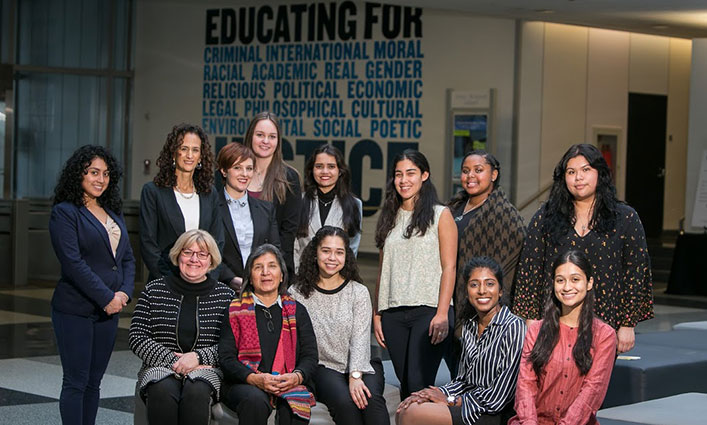
John Jay is known as a leader in preparing students for careers in international relations, and this March, following a years-long tradition, students and faculty members participated in the 62nd United Nations Commission on the Status of Women (UNCSW). The annual two-week series is devoted to exploring issues that impact women across the globe and finding solutions to gender inequity.
In past years, students have attended session events at the U.N. headquarters. For this year’s UNCSW, which was focused on empowering rural women and girls, faculty members Jodie Roure and Gabriela Ramirez-Vargas of the Latin American Studies Department received an invitation to organize a UN-sponsored panel at John Jay. According to Ramirez-Vargas, the invitation was extended for two reasons: Roure’s extensive research into the rise of domestic violence against women in Puerto Rico post-Hurricane Maria, and Roure’s commitment to involving students in her work.

“We like to include students at every level,” says Ramirez-Vargas, who moderated the panel and recruited students to collect the data she presented. The panel explored how international law could eliminate violence, and it featured several prominent speakers from across the globe, including Rashida Manjoo, Professor at the University of Cape Town and Former U.N. Special Rapporteur for Violence Against Women. Students had the opportunity to meet and network with Manjoo and others, an experience that Ramirez-Vargas says is extremely valuable for their future careers.
“These opportunities open up doors for students,” she says. “Hearing these leaders tell their stories and how they got to their positions inspires students. Even being inside the U.N. building is empowering.”
Graduate students from the International Crime and Justice Department also partook in UNCSW events. Gloria Genao, who is completing a master’s degree in International Crime and Justice, is an intern at the International Sociological Association (ISA), an organization that she represents at U.N. General Assembly meetings. She organized a side event for the UNCSW, and while it shocked her to learn facts like half of all rural women lack basic literacy skills, the conference ultimately filled her with hope. “We’re in 2018, but a lot of women are still suffering,” she says. “It was amazing to see so many countries—from Sierra Leone to Spain—coming together to try to make a difference.”
“We’re in 2018, but a lot of women are still suffering. It was amazing to see so many countries—from Sierra Leone to Spain—coming together to try to make a difference.” —Gloria Genao ’18
Genao, who speaks English, Spanish, and French, earned a law degree in the Dominican Republic, where she was born and raised. When she moved to New York, she enrolled in John Jay with an interest in learning more about international law, but because she had never taken classes in English, the program was at times difficult. “For me, it wasn’t easy to get this degree because I think in Spanish,” she says.
Despite the obstacles, Genao exceled and will graduate in May. Genao, who is in the process of becoming a citizen, expects the opportunities she’s received at John Jay to lead to new possibilities for her career. “With this master’s, I hope I can become even more involved at UN and start working on international cases,” she says. “I’m in love with this field.”



